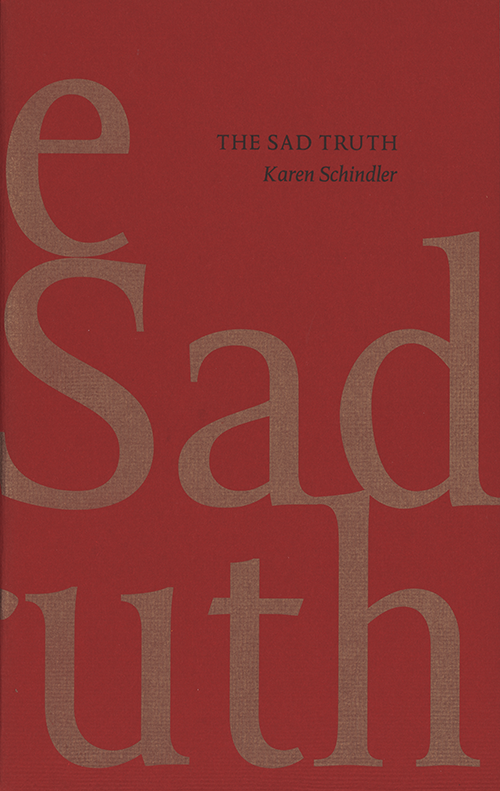Karen Schindler, The Sad Truth
Few poets in Canada glimpse half the eyeful of beauty Schindler evidently beholds.

Every Gaspereau book is a ligature-laden adventure into printing, their Devil’s Whim Occasional Chapbook Series mentioned in the back of the book being another foreshadower of the surprises yet to come, and to which Karen Schindler (of Baseline Press in London, Ontario fame)’s The Sad Truth very much belongs.
It can be devilishly difficult to acquire Gaspereau Press’s books which is why when I did, I bought many at once, and so I am certain the Devil’s Whim will come back up again down the road, fellow reader.
Karen Schindler is massively humble and generous. I recall her sending me every flight of Baseline Press books, for my former review blog, Literatured, up until I couldn’t do them justice anymore, and I appreciated the hell out of it.
At the time, I was mostly reviewing Mansfield Press books, relatively obscure things from university presses and once the NYRB sent me something pretty good, and I had acquired a lot of ARCs from Canadian publishers such as Insomniac Press, Coach House, and Wolsak & Wynn.
So to hold the inaugural set of Baseline Press books for the first time was a wholly unanticipated experience for me. Nobody was doing anything quite like her and I haven’t encountered books from any press since like them, although Wolsak & Wynn, The Porcupine’s Quill and Gaspereau definitely have a knack for paper and type like her, they each have their set of quirks and signature production techniques drastically different from how she operates as a printer.
The Sad Truth was published in 2023 and the manuscript bears a sumptuous digital revival of a 1961 typeface by the name of Octavian, an almost machine-sanded German Gothic-looking serif font that somewhat resembles the 18th-century Italian Bodoni, but less modern, more prone to all caps, with more reserved apertures and more suited to print than titles and headings.
The chap opens with an epigraph from Virginia Woolf’s Mrs. Dalloway that reads:
It was a silly, silly dream, being unhappy.
Each poem in the work is titled “The Sad Truth About” blank, and broaches a number of subjects throughout the course of the work, beginning with the opening poem:
THE SAD TRUTH ABOUT ENGINEERS
Bed propped up by a stack of textbooks,
twist of sheets at our feet. Outside the window,
sunflowers. Morning unfurls, breathes
a balanced proposal into my ear, submits
love is a pattern that grows without
giving up form. I accept this as definition.
Eadem mutata resurgo. Near death,
Jacob Bernoulli, Swiss pioneer of spiral
mathematics, requests a helix curve
be engraved above the epitaph
I arise again the same, though changed.
Our love assumes a shape:
row on row of small black seeds turning in
on a hypothetical heart.
This opener is breathtaking. We are provided this cozy setting, messy bed surrounded by books, window view with sunflowers that make it feel like a still life painting in verse. And then we get the sad truth: Bernoulli accepts his fate. And, in accepting his fate, he leaves behind this deceivingly simple statement with the symbol of a helix curve.
But it really contains everything, in a way, everything there is to say about life and the wonder of the universe in the eyes of the engineer. It’s self-contained but infinite.
I am ashamed to admit I did not know Karen Schindler wrote poems like this. This is really beautiful and we’re only on page one.
Not every poem frames the story of a major historical figure, but every poem is written in a different form.
The next page over, we encounter tercets:
THE SAD TRUTH ABOUT TEACHERS
He comes red-eyed through the door. His jeans
fray. His t-shirts seem to be shrinking.
At the back of the room, I open him
like a book. Hinge of elbow,
bird-like wrist. How he holds the chalk
like his cigarette, after school in the parking lot,
a fuse burning towards long fingers.
Girls have begun asking questions just to see
his eyelids lower, their pale blue veins.
When we start the unit on thermodynamics,
he says absence of change leads to absence
of any tendency for change. Class ends.
He invites me to the downtown copy centre,
to help bind next week’s notes
on momentum and its conservation.
The entire football team watches
as I get out of his car. That night
I find his house, stand outside his door.
This poem begins like a harlequin romance and ends like a melodrama that I can’t help but compare to Don’t Stand So Close to Me by The Police in my head. Schindler does not specify an ending to this tawdry crush she spends five out of six stanzas setting up; the sadness is more than implied, however.
Even without knowing where this story ends, the three final lines give us these two scenes in one: the entire football team (of men) watching her exit his vehicle and her, later, on her own, approaching his home, leaving little to the imagination. But leaving something. Only the speaker of the poem knows how this story ends.
The next three poems are titled The Sad Truth About TV, The Sad Truth About Autumn, The Sad Truth About Four Small Things.
I am going to fast-forward, however, to the following poem:
THE SAD TRUTH ABOUT TRANSLATION
When I think of the man I’ve been trying to change,
I hear faint drumming. My friends are concerned.
They suggest I concentrate on the chatter
of squirrels, or the distant howl of traffic
from the city. Perhaps they are forgetting
the number of ways people hurt each other
without knowing. As when an author writes of loss
and the one who loves him reads it as a call
for someone new. In Malone Dies, Beckett’s narrator
tries to find joy in anticipating the end of joy.
What he wants? Something to silence the relentless
tickertape of his heart. In darkness, a barking
drifts down from the hills; the valley dogs
answer in the one voice they know.
Scattered lights, marking clusters of homes,
merge into blurs scarcely there: a shift so slow
he almost misses it. Today, as I consider my inability
to move past sorrow, I resolve
to turn towards it, the way we look to subtitles
for a language we will not learn.
This really summarizes the duality of sentimentality in this work. Something about that Woolf epigraph earlier made me think of opening Le Rouge et le noir by Stendhal for the first time and, likely in an introductory essay to the novel in the particular copy I had (the rouge edge-painted Livre de poche edition), reading about his fondness for the applicability and irony of Shakespeare's phrase “the Happy Few.” The Sad Truth very much features this recurring motif of accepting one’s fate, but in an enlightened way, no stranger to adversity. The Happy Few.
Karen Schindler’s chapbook takes this Stendhalian dichotomy of happiness and sadness and does the opposite with it. She not only feminizes it (Stendhal was a deeply flawed romantic as much as he was a deeply flawed man) but, as she puts it in this poem, turns towards sorrow, and in a way that empowers her to unleash these incredibly distinct and expressive, and descriptive, poems.
Karen Schindler’s poetic hand reveals itself to be undeniably potent. If reading this review is your first time hearing of her Baseline Press, then you can only imagine what she manages to do with a flyleaf and a piece of string. She is as competent under one cap as the other and is objectively equal halves poet and publisher.
Few poets in Canada glimpse half the eyeful of beauty Schindler evidently beholds.
Not because she’s a publisher-poet, but because she truly loves words down to their very letters, in every form, and with every twist of the knife. She manages to leverage her competency of the craft and her adoration for history, science and literature into these objects of awe-striking reflection and revelation.
Karen Schindler is a once-in-a-lifetime maker and you’d be lucky to get a hold of any work she prints, edits or writes. What a privilege and honour it was to read The Sad Truth.
Bibelotages Newsletter
Join the newsletter to receive the latest updates in your inbox.



